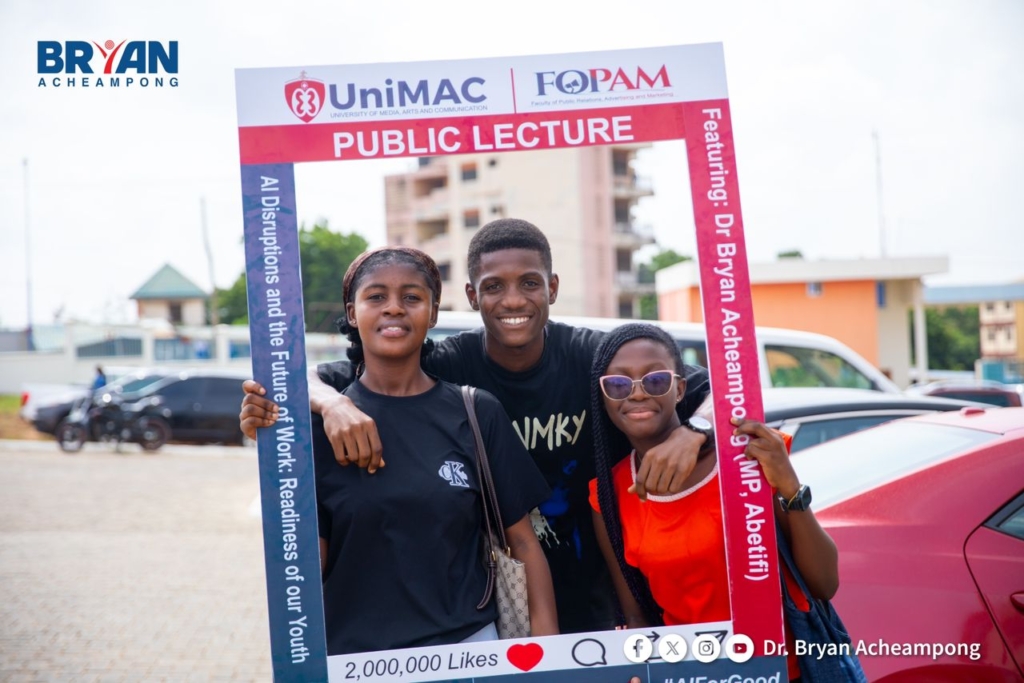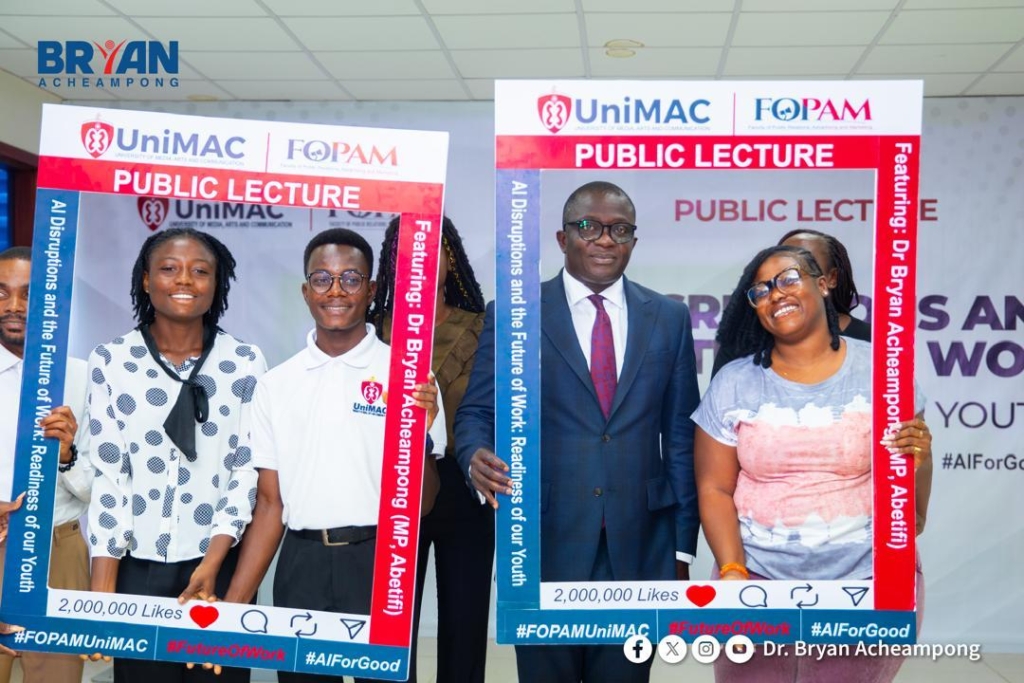General
UniMAC hosts Dr Bryan Acheampong for landmark AI and future of work lecture
The University of Media, Arts and Communication on Thursday, June 26, 2025 played host to a landmark public lecture by former Minister for Food and Agriculture, IT expert and current Member of Parliament for Abetifi, Dr. Bryan Acheampong, on the theme “AI Disruptions and the Future of Work: Rea...
MyJoyOnline
published: Jun 26, 2025


The University of Media, Arts and Communication (UniMAC) on Thursday, June 26, 2025 played host to a landmark public lecture by former Minister for Food and Agriculture, IT expert and current Member of Parliament (MP) for Abetifi, Dr. Bryan Acheampong, on the theme “AI Disruptions and the Future of Work: Readiness of Our Youth.”
The lecture, part of UniMAC’s Distinguished Speakers Series, brought together students, lecturers, policymakers, creatives, and the media for a powerful engagement on how Artificial Intelligence (AI) is reshaping work and how Ghana can prepare its youth and institutions for the future.
In what many described as a thought-provoking and forward-looking presentation, Dr. Acheampong, a technologist and policy scholar with a PhD in Information Systems, delivered a call to action for Ghana to embrace AI not as a distant innovation, but as an active force that is already transforming industries from agriculture to media.
Returning to UniMAC, where he earned a certificate in Public Relations, Advertising, and Marketing in 2014 (then Ghana Institute of Journalism), Dr. Acheampong described the moment as a homecoming. “I might have used ChatGPT to help with my PR briefs had it existed back then,” he joked, before turning to a thought-provoking message about AI’s power to both disrupt and uplift.

“AI may change jobs, but it does not erase human value,” he said. “It replaces tasks, not people. And if we’re prepared, it can multiply, not diminish our potential.”
He emphasised that Ghana must not wait to respond to the AI revolution but must take a leadership role by developing a coherent national posture. According to him, this includes a National AI Policy, a Ghana AI Futures Taskforce, and a Skills Transition Plan that reaches not only urban youth but rural, informal, and underserved communities.
The former Minister identified four sectors already experiencing AI’s influence, naming agriculture, education, public service, and the creative and media industry.
He cited initiatives from his tenure as Minister of Agriculture, including the launch of the Ghana Agriculture and Agribusiness Platform (GhAAP), which used digital tools to streamline farm operations. He explained how AI can take such platforms further with crop disease diagnosis apps, predictive price models, and smart logistics—all vital to modernise farming.
In education, Dr. Acheampong highlighted his own academic research, including a 2023 co-authored study on ChatGPT’s use in Ghanaian universities.
The study found that students were more likely to embrace AI when they trusted its purpose and saw its usefulness.
“We must not only teach AI, but demystify it,” he said, calling for updated curricula, teacher training, and experiential learning environments where students can use AI tools creatively and ethically.

In the public sector, he made a case for AI-powered service delivery—chatbots for citizen queries, real-time data for district management, and predictive tools for policy planning. But he stressed that digital systems must be introduced through inclusive dialogue and transparency to build public trust.
In one of the most anticipated segments of the lecture, Dr. Acheampong turned his attention to UniMAC’s core constituency—the creative and media industries. He described this sector as Ghana’s “AI goldmine,” with opportunities to automate editing, optimise audience targeting, detect misinformation, and tell stories more powerfully across digital platforms.
“AI won’t replace your creativity,” he told the students. “But it will reshape how it’s monetised, protected, and distributed.”
At the heart of his presentation was a strategic framework for Ghana’s AI future based on three pillars: trust in systems, adaptive human capital, and institutional readiness.

He argued that trust must be built through transparency, local language communication, and inclusive AI governance. On skills, he called for a shift from rote learning to design thinking, coding, and ethical reasoning—delivered not only through universities but also through community-level training.
His proposals included the creation of micro-credential programs in AI, public-private partnerships with tech startups, and national campaigns to build digital literacy from the grassroots up.
“Ghana’s digital future will not be defined in Silicon Valley. It will be shaped here—by the students, civil servants, creatives, and entrepreneurs who know this land and its needs,” he said.
Read More